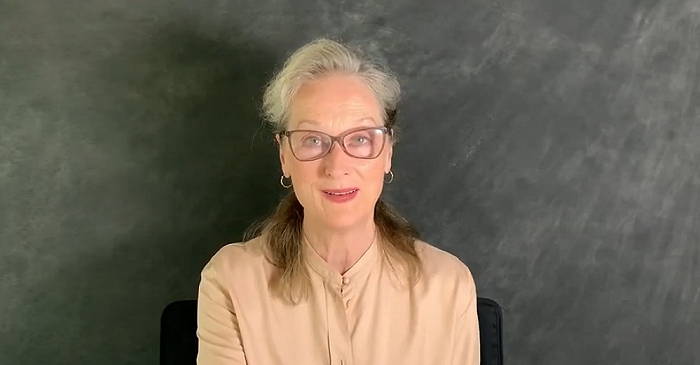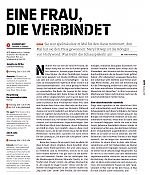

The TV industry’s shiniest night of the year, a.k.a. the Primetime Emmy Awards, looked much different this year, given the never-ending pandemic. The ceremony’s host, Jimmy Kimmel, was literally fired up to emcee the festivities again, this time from the mostly vacant Staples Center in L.A., with winners accepting awards remotely, virtually, and digitally. If you tuned in just for Meryl, there wasn’t much to see. She was nominated as Outstanding Supporting Actress in a Drama Series for “Big Little Lies” along her co-star Laura Dern as well as Fiona Shaw (Killing Eve), Sarah Snook (Succession), Helena Bonham Carter (The Crown), Samira Wiley (The Handmaid’s Tale) and Thandie Newton (Westworld), but “lost” to Ozark’s Julia Garner, and wasn’t featured by camera during the nominations. Garner took to Instagram after winning the Emmy to praise her fellow nomninees, including Meryl: “Also I want to give a special thanks to Meryl Streep, who wasn’t on the zoom call tonight. When I was 15 I watched Sophie’s Choice and it made me want to be an actress. I wouldn’t be doing this if it weren’t for you. And thank god because I don’t really know how to do anything else!! So thank you. Love to you all!!” The category segment can be watched below and in the video archive.
Video Archive – Award Ceremonies – 72nd Primetime Emmy Awards (2020)
Meryl Streep may not have an Instagram account, but she is mugging on the platform for a cause with Kageno. Streep is among the more than two dozen stars and notable names who posed in vibrant aprons as part of a social media campaign on behalf of nonprofit Kageno as a way to spotlight its upcoming event. The organization — founded in 2003 and focused on transforming communities in need in Kenya and Rwanda — is hosting a virtual gathering Sept. 23, an annual Harambee, which has been reimagined to be a fundraiser-meets-cooking celebration. Streep, a longtime supporter of Kageno, will deliver the keynote address as part of a program that also features Minnie Driver and Dylan McDermott addressing attendees, pop star Anastacia performing, and celebrity chef Todd English spearheading a cooking demo that guests can follow along with at home (ingredients can even be delivered in advance). The event also includes a silent auction featuring items modeled by Lydia Hearst and Chris Hardwick. The aprons featured in the social media campaign were designed and made by the African villages supported by Kageno. All shoots were conducted via FaceTime and photographed by Scott Buccheit. In addition to Streep, those who participated include Anne Dexter-Jones, Allie Rizzo, Omar Shariff, Jr., Gillian Hearst, Naeem Delbridge, Daniela Lopez, Alex and Keytt Lundqvist, Scott Cullens, Maggie Rizer, Mia Moretti, Selita Ebanks, Robin Roberts and Amber Laign, Johnny Bananas, Sam Champion, Marc Forgione, Buster Skrine and many others. More information about the event can be found here. The article was originally published by The Hollywood Reporter with many thanks to Glenn for the heads-up.

On September 06, Meryl Streep has joined the National Domestic Workers Alliance to pay tribute to the lives and work of essential workers. As per their website: Together we’ll issue a powerful call for transformation in honor of the people that we’ve lost and to fight for the working people who are essential to our economy and society. These essential workers are disproportionately Black and other women of color, immigrant, and other communities in the margins. We have a responsibility and opportunity to create an inclusive future that ensures that everyone is treated with dignity and respect–through raising pay and workplace standards, improving safety, and increasing worker power in the workplace. Meryl’s segment starts at 1:15:43
Director Ryan Murphy shared a photo of his cast on Monday in which Streep debuted red hair while wearing hoop earrings, red lipstick and a red shawl. “Meet the incredible icon-packed cast of Netflix’s THE PROM. A group of true troopers who buckled up and finished shooting during COVID so we could give everybody an inspirational aspirational story that we all need right now,” Murphy wrote in the caption. The American Horror Story creator teased the release date, adding, “Christmas is right around the corner…” The Prom follows the story of Emma (Pellman) and Alyssa (DeBose), two high school students in love. When they’re banned from attending prom together, a group of fading Broadway stars (Corden, Kidman, Streep, Rannells) learn of their trouble and seek to help. Streep is playing Dee Dee Allen, a Broadway performer who stars in a flop musical about Eleanor Roosevelt alongside Corden’s character. The adaptation follows a successful run for the musical that earned seven Tony nominations, including best musical and best book of a musical. The Prom also made history in 2018 by featuring the first same-sex kiss televised on the Macy’s Thanksgiving Day Parade. The film is set to stream on Netflix later this year.
Monumental Women, the all-volunteer nonprofit group bringing the first statue depicting real women to Central Park, is pleased to announce that award-winning actors Jane Alexander, Viola Davis, America Ferrera, Rita Moreno, Zoe Saldana and Meryl Streep will portray Sojourner Truth, Susan B. Anthony and Elizabeth Cady Stanton in English and Spanish-Language ‘Talking Statues’ monologues that will accompany the Women’s Rights Pioneers Monument. The Monument featuring Truth, Anthony and Stanton is set to be unveiledon Central Park’s Literary Walk on August 26, 2020, the centennial anniversary of the ratification of the 19th Amendment, when women won the right to vote. Actors Jane Alexander and America Ferrera will voice Anthony, Viola Davis and Zoe Saldana will voice Truth, and Meryl Streep and Rita Moreno will voice Stanton. Monumental Women began working to develop the Women’s Rights Pioneers Monument and “break the bronze ceiling” by securing a prominent location on Central Park’s famed Literary Walk in 2014. In the statue, Bergmann shows Anthony, Stanton, and Truth working together when they met to advance thefight for equality, justice, and women’s rights. They are depicted as equals, working together ata table, with each taking on an essential element of activism: Truth is speaking, Anthony is organizing, and Stanton is writing. The Women’s Rights Pioneers Monument honors three New York women who dedicated their lives to women’s rights and to women winning the franchise, though none of them lived long enough to see it happen. The public can easily access the monologues by scanning a QR code on a smart-device or by downloading the Talking Statues app on a mobile device.The app is part of Monumental Women’s educationcampaign to educate Park visitors, young people and schoolchildren around the world aboutwomen’s history. Many thanks to Alvaro for the heads-up.

At the beginning of this year, some of the biggest names in Texas media left their respective organizations to begin a new one. Former Texas Tribune Editor Emily Ramshaw and Chief Audience Officer Amanda Zammora founded the 19th*, a national nonprofit newsroom focused on the “unfinished business of the 19th Amendment” granting (white) American women the vote in 1920. Andrea Valdez, formerly editor-in-chief of the Texas Observer, fills the same role at the 19th, and Errin Haines, previously national writer on race for the Associated Press, is editor-at-large. Next week, Aug. 10-14, the nascent enterprise is bringing together some more big names of American politics and culture in a “virtual summit,” the 19th Represents. Speakers including Stacey Abrams, Alicia Garza, Hillary Clinton, Kamala Harris, and Meryl Streep will headline discussions on the intersection of race and gender issues, voting rights, and electability. Updated: As part of The 19th Represents, Award-winning actors Meryl Streep and Zoe Saldaña perform excerpts from historic speeches by American suffragists – women like Inez Milholland; Sojourner Truth; Crystal Eastman and Frances Ellen Watkins Harper, who fought not just for the right to vote, but for racial justice for women. The 19th Represents is the inaugural summit of The 19th News, a new nonprofit, nonpartisan newsroom reporting on gender, politics and policy. To learn more about The 19th, visit summit.19thnews.org.
Video Archive – Miscellaneous – The 19th Represents: Voices of Suffrage (2020)
The German/French tv channel ARTE celebrates the “Summer of Dreams” with films and documentaries, but for us it will be the “Summer of Streep” in August. On August 23, 2020 at 22:50pm, the broadcaster will air a brand new documentary on Meryl Streep titled “Meryl Streep: Die unverstellte Göttin” (the genuine goddess), right after a broadcast of “Out of Africa” at 20:15pm. The documentary will be featured on the ARTE website starting August 21 and will be available on-demand for a month. On Sunday, August 30, there will be a broadcast of “Julie & Julia” at 20:15pm. Their special on Streep is accompanied by a lovely cover story and article in the August issue of ARTE Magazin, which you can find in the photo gallery. Many thanks to Katrin for the heads-up.
Photo Gallery – Articles & Scans – 2020 – ARTE Magazin (Germany, August 2020)
Press Library – 2020 – ARTE Magazin (Germany, August 2020)

Big congratulations to Meryl Streep for receiving a Primetime Emmy Award nomination earlier today as Outstanding Supporting Actress In A Drama Series for “Big Little Lies”. She shares the crowded category with Laura Dern for “Big Little Lies”, Fiona Shaw for “Killing Eve”, Julia Garner for “Ozark”, Sarah Snook for “Succession”, Helena Bonham Carter for “The Crown”, Samira Wiley for “The Handmaid’s Tale” and Thandie Newton for “Westworld”. “Big Litte Lies” fared ok in the overall nominations with five, although only two actresses – Dern and Streep – made the cut. The other nominations come in the categories for Outstanding Production Design For A Narrative Contemporary Program, Outstanding Casting For A Drama Series and Outstanding Contemporary Makeup. In comparison, the first season of “Big Little Lies” scored 16 nominations in 2017, winning 8 – including for Outstanding Limited Series and its stars, Nicole Kidman, Laura Dern and Alexander Skarsgard. Meryl Streep’s track record at the Emmys is equally impressive – she has won 3 Emmys out of 4 nominations so far – as an actress for “Holocaust” in 1979 and “Angels in America” in 2004 as well as a narrator for the Netflix documentary “Five Came Back” in 2017. The Emmys will be handed out on September 20, 2020. Edit: Meryl’s management forwarded the following reaction to various news outlets:
Thank you!!! I am very honored to be in the company of such gifted women, who have helped us all get through this screen centered moment in time!”
According to The Hollywood Reporter, Ryan Murphy’s film The Prom – starring Meryl Streep, Nicole Kidman and James Corden – is starting up production again on Thursday at Raleigh Studios in Hollywood. The movie, which had two days left of shooting when the pandemic forced an industry-wide shutdown, is slated to film for the next four days. Not all of the stars are expected to be on set, however, as some had already wrapped their parts. Murphy’s star-studded Broadway adaptation marks the second major project from the streamer to return to production in the U.S. this month, after Adam Sandler’s comedy movie Hubie Halloween went through with a day of pick-ups earlier in July. The production was said to go off without a hitch, though insiders note that the streamer was limited in what it could draw from the experience given the short duration of the shoot. Since The Prom plans to film for multiple consecutive days, sources say it’ll likely serve as a better test case for the company, which sources note has developed its own set of health and safety protocols. Says one insider, “Netflix is serious about the plan they put together and is using this as a test run for their other productions.” Given the fluid nature of the situation, some studios, including Warner Bros. and Universal’s TV arms, have pushed back their target shoots dates from August to September. Holding them back, say insiders, are continued negotiations with the guilds over aspects of the COVID protocols. Among the issues still being hashed out: the role of COVID-19 managers, the frequency and type of testing, 10-hour workday caps and sick day compensation (meaning whether or not crew members who fall ill to the virus still get paid).
Monumental Women, the all-volunteer nonprofit group bringing the first statue depicting real women to Central Park, has announced that award-winning actors Jane Alexander, Viola Davis, America Ferrera, Rita Moreno, Zoe Saldana and Meryl Streep will portray Sojourner Truth, Susan B. Anthony and Elizabeth Cady Stanton in English and Spanish-Language ‘Talking Statues’ monologues that will accompany the Women’s Rights Pioneers Monument. According to Broadwayworld.com, The Monument featuring Truth, Anthony and Stanton is set to be unveiled on Central Park’s Literary Walk on August 26, 2020, the centennial anniversary of the ratification of the 19th Amendment, when women won the right to vote. Actors Jane Alexander and America Ferrera will voice Susan B. Anthony, Viola Davis and Zoe Saldana will voice Sojourner Truth, and Meryl Streep and Rita Moreno will voice Elizabeth Cady Stanton. Monumental Women began working to develop the Women’s Rights Pioneers Monument and “break the bronze ceiling” by securing a prominent location on Central Park’s famed Literary Walk in 2014. The organization raised $1.5 million in private funding to pay for the statue, which is being designed by nationally-recognized sculptor Meredith Bergmann. In the statue, Bergmann shows Anthony, Stanton, and Truth working together when they met to advance the fight for equality, justice, and women’s rights. They are depicted as equals, working together at a table, with each taking on an essential element of activism: Sojourner Truth is speaking, Susan B. Anthony is organizing, and Elizabeth Cady Stanton is writing. The Women’s Rights Pioneers Monument honors three New York women who dedicated their lives to women’s rights and to women winning the franchise, though none of them lived long enough to see it happen.













